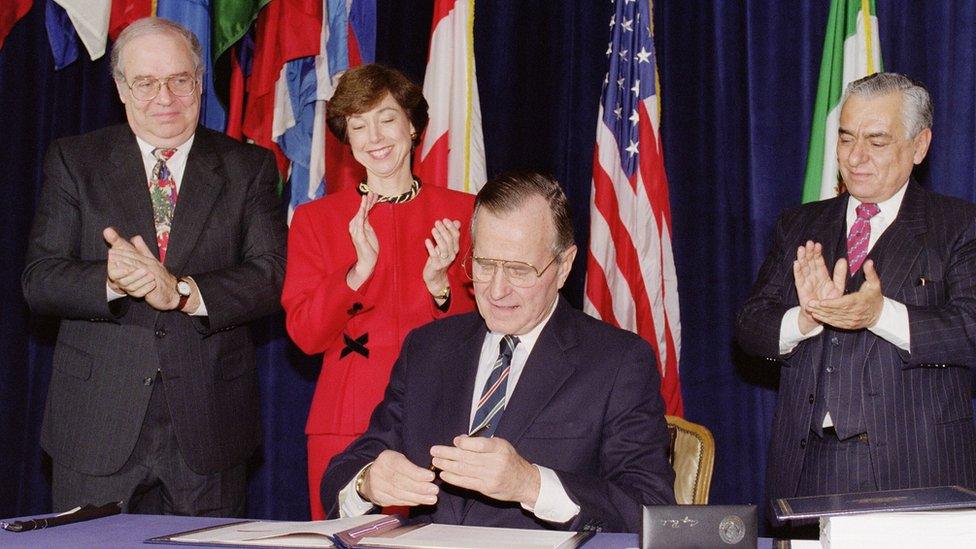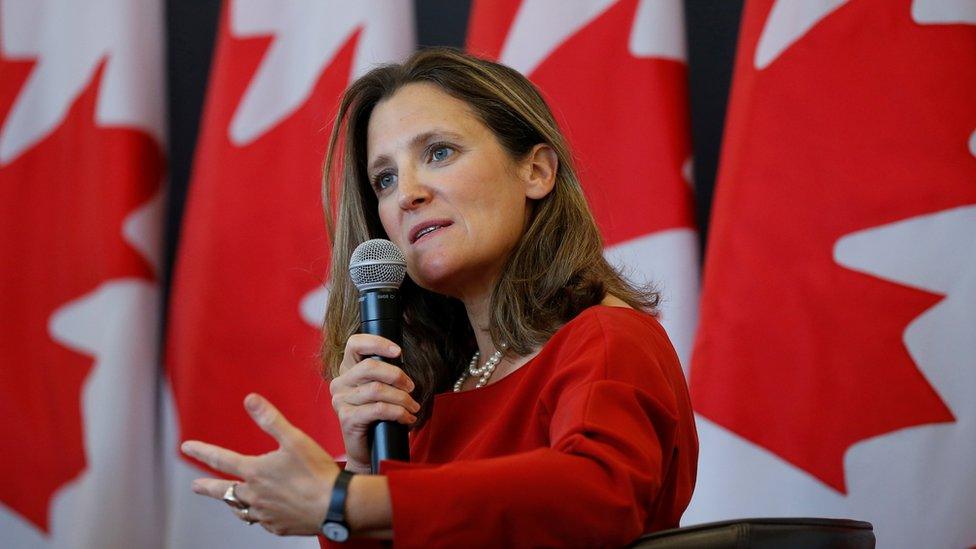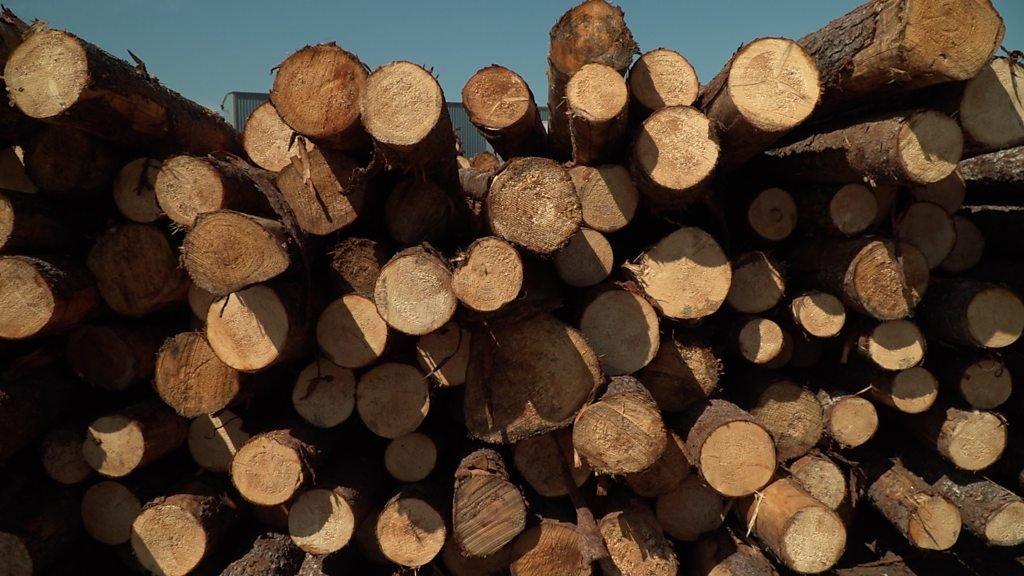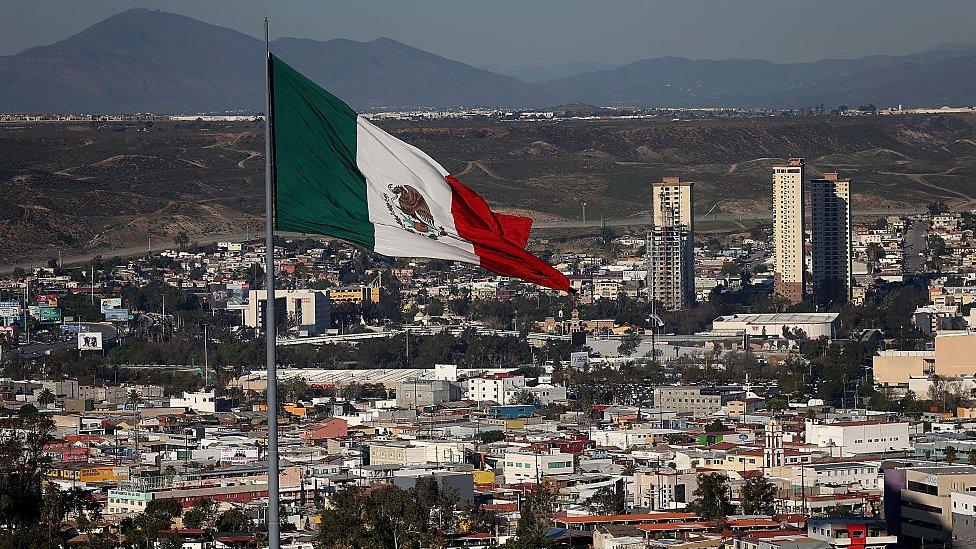What's at stake as Nafta talks begin?
- Published

Former US president George Bush signs the Nafta agreement in 1992
Trade talks might in the past have signalled a dry and dusty item on the news agenda, but the renegotiation of Nafta under President Trump has become a political hot potato.
Mr Trump has called this free trade agreement between the US, Canada and Mexico a jobs "killer" and a "disaster", and pledged to repeal it.
But in April, he pulled back and agreed to discuss "modernising" the North America Free Trade Agreement.
Talks between the three countries about overhauling the pact start in Washington on Wednesday.
Mr Trump has maintained his rhetoric against Nafta, blaming it for the country's large trade deficit with Mexico, and suggesting US manufacturing jobs have been lost across the border.
However, Canada and Mexico argue for updating the pact and business has lobbied in favour of an arrangement which now covers $1tn worth of trade across North America in a broad range of industries from dairy to automobiles.
What is Nafta?
Nafta, which came into effect in 1994, lowered tariffs for most traded goods and services and established rules covering food safety, intellectual property rights and dispute settlements.
Since the deal was signed, trade between the three countries has more than tripled.
Political ties between the three countries have also strengthened.
Why are Trump and Trudeau fighting over trees?
What is the problem now?
Apart from Mr Trump's long-touted push for a better overall deal for the US, there are a number of specific areas which will be on the negotiating table.
All three countries have said they plan to revisit labour and environmental rules.
They have also said they are focused on updating the agreement to capture changes due to online businesses and other technology advances.
What is the process?
The talks will unfold over several rounds, rotating from Washington to cities in the other two countries.
Negotiators will be under pressure to conclude before the issue can become a political football during election cycles.
In the US, Mr Trump will want to claim a new deal as a political victory before mid-term elections in 2018.
And there is a general election due in Mexico in July 2018.
What does the US actually want?
The deal has been a boon for US industries such as agriculture, but Mr Trump blames Nafta for a decline in US manufacturing jobs. (Others say automation and opening trade with China had a bigger impact).
In July, US Trade Representative Robert Lighthizer said, external the administration is focused on changes that will reduce the trade deficit, or imbalance between imports and exports. That means the US importing less from its neighbours, especially Mexico, or boosting US exports.
The US said it would push for greater access to the Canadian market for US dairy, wine, grain and other products.
It has also said it wants to tighten rules that identify where items come from. That's drawn opposition from groups such as the automobile industry, whose supply chains now involve moving raw materials and parts across multiple borders throughout the Nafta area.
The US may also seek to strengthen its hand to promote American goods for "Buy America" government programmes.
What does Canada say?
Canada's Foreign Affairs Minister Chrystia Freeland has said Nafta has benefited the Canadian economy, making it 2.5% larger annually than it would otherwise be.
She described the talks this week, external as an opportunity "to make what is already a good agreement, even better".

Canadian Foreign Affairs Minister Chrystia Freeland said an updated trade deal could help workers at home and abroad
Ms Freeland said Canada wants to make the agreement more progressive, by addressing labour, environment, gender and indigenous rights, among other items.
"If we get this right, the working people of all three countries will benefit," she said.
What does Mexico say?
Mexico says, external Nafta has helped its manufacturing plants and agricultural sector become more globally competitive.
Negotiators say they would raise issues that include easing and clarifying migration rules for seasonal workers, better border infrastructure and greater integration of telecom markets.
- Published16 August 2017

- Published14 August 2017

- Published18 July 2017
